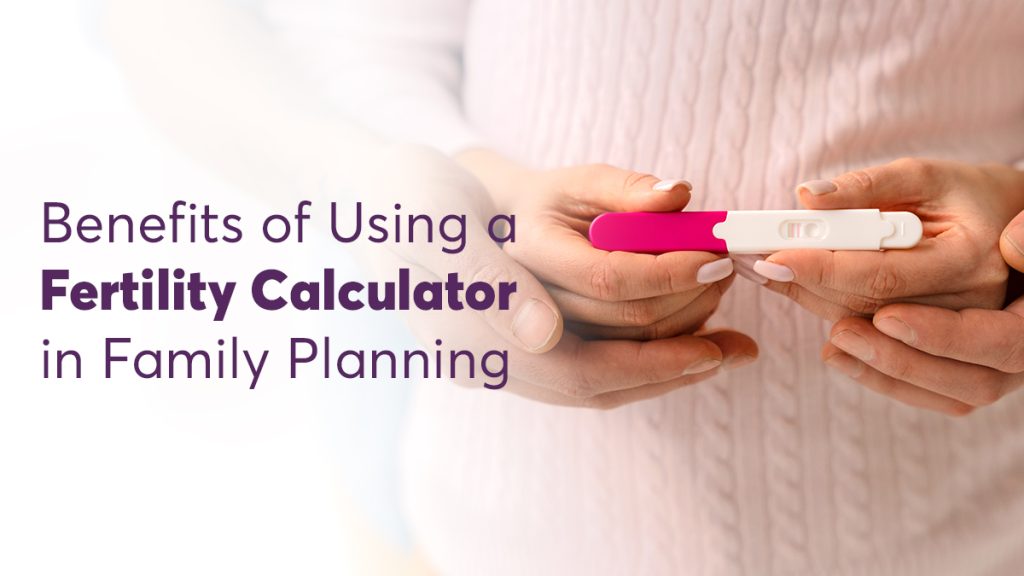Wouldn’t it be wonderful to hold your baby in your arms and hear giggling sounds when you whistle? You and your partner may be very excited to start a family. There are several things you can do to increase the chances of pregnancy. One of them is using a fertility calculator. This simple tool helps you take out the guesswork and know the days on which your chances of conceiving are highest. Explore the benefits, considerations, and uses of an ovulation calculator.
What is a Fertility Calculator?
Think of it like your personal ovulation calculator and menstrual cycle tracker. Ovulation calculators use the start date of your last period and the menstrual cycle length to calculate the most fertile days. While the average cycle length globally is 28 days, it varies anywhere between 23 to 35 days for women who are in the reproductive age. Your most fertile widow starts about 2 days before ovulation and ends 2 days after it. Considering that the ovulation lasts between 12 to 24 hours, you have about 5 to 6 golden days that offer you the highest chances of getting pregnant.
Types of Fertility Calculators
You can use online or mobile apps.
Online Apps:
Access these on your browser and input your menstrual cycle data to predict the fertile days. Some web apps may calculate your window with the knowledge of only one cycle. Others may allow you to create an account and track your cycle regularly.
Mobile Apps:
Carry your fertile window tracker in your pocket! The best part is that you have the app handy and can update it whenever you want.
Advantages of Using a Fertility Calculator
There are several advantages of using an ovulation calculator:
Predict Fertile Window
This is the most obvious one.
Identify the Most Fertile Days:
Know exactly when you have the highest chances of ovulation.
Increase the Probability of Conception:
Knowing your fertile window improves the chances of getting pregnant.
Planning and Timing
Optimise Sexual Activity:
Plan time with your partner and push aside any stressful activities to optimise the time.
Scheduling Aid:
Planning an adventure trip? Choose the follicular phase (2 weeks right after your period ends), as this is when you feel the most energetic.
Educational Resource
Increase Knowledge:
Understand your menstrual cycle and reproductive health better.
Track Patterns:
Over time you can assess cycle patterns to better understand mood swings and what your body goes through each month.
Accuracy and Limitations of an Ovulation Calculator
Ovulation calculators use machine learning-based analytics to predict your fertile days. However, they depend on the regularity of your cycle. Even the most accurate fertility trackers cannot predict fertile windows for those who have very irregular periods.
Fertile window calculators assess your menstrual history over a few months to incrementally improve the accuracy of predictions. With an irregular history, data analysis alone is insufficient to provide accurate results. This may create challenges in predicting the best days for planning sexual activity to get pregnant. Don’t worry. You can always consult a fertility specialist to help you with identifying your ovulation days.
User-Friendly Features
Not tech-savvy? No need to worry about that. Ovulation trackers are loaded with features to ease your life. All you need to do is:
- Enter the date of start and end of your period.
- Enter your cycle length (number of days between the start of two periods).
Enjoy the following features:
Reminders: Set alerts for your fertile window, ovulation test, menstrual dates, and much more.
Cycle Tracking: Get a detailed analysis of the regularity of your cycle. No need to manually count days and circle dates on the calendar.
Symptom Logging: Track your mood swings, cervical mucus quality, soreness, and other symptoms to learn more about how hormonal changes affect your body.
Psychological Benefits
Some more not-so-apparent benefits of a fertility tracker are:
- Reduced Stress and Anxiety: Provides clearer insights into fertility, reducing stress for both you and your partner.
- Empowerment: Enhances self-awareness and proactive health management, giving you a sense of control. Adjust your diet, workout intensity, and sexual activity according to your fertile window.
Considerations Before Using Fertility Calculators
It is crucial to understand that a fertile days calculator can only tell you about your cycle. It is not the ultimate solution to improve fertility. You may consult a fertility doctor to understand your chances of conceiving. For those who have irregular periods, visiting an experienced healthcare professional is particularly important. Not just for an ovulation test kit, but to consult if you’re experiencing changes in cervical mucus, breast soreness, or abdominal discomfort. Your doctor can guide you about how to address fertility issues due to irregular periods, to improve your chances of natural conception. It is a good idea to opt for a pre-conception consultation if you have been trying to get pregnant for over 12 months and if you are over 35 years old.
Conclusion
Fertile window calculators are handy tools that offer valuable insights into your reproductive health and conception window. The most accurate fertility trackers can make your family planning efforts more fruitful. Understanding their limitations and getting professional advice can help you to use them effectively. Embrace fertility calculators if you’re planning on starting a family as well as if you want to follow a comprehensive approach to your reproductive health and well-being.

